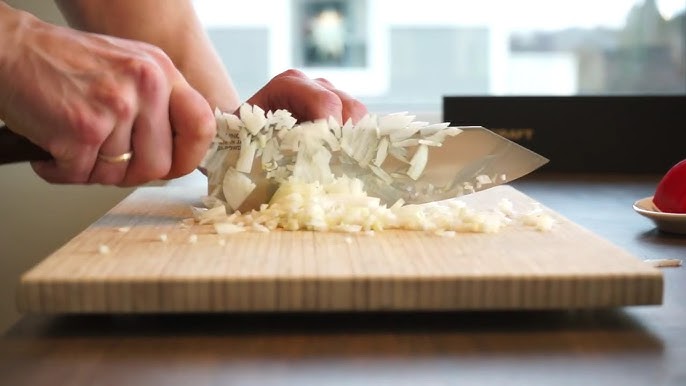In the world of culinary arts, the debate over German knife steel hardness vs sharpness often sparks passionate discussions among kitchen professionals. Understanding the delicate balance between these two attributes is crucial for anyone serious about their craft. This article delves into the intricacies of German knife steel, providing insights into what makes these knives a staple in professional kitchens worldwide.

Understanding Hardness and Sharpness
Before we dive into the specifics of German knives, it's essential to comprehend what we mean by 'hardness' and 'sharpness.' Hardness refers to a steel's ability to resist deformation. In knife terms, this means how well a blade can maintain its edge and withstand wear and tear. Knife hardness is typically measured using the Rockwell scale, with higher numbers indicating harder steel.
Sharpness, on the other hand, refers to the edge's ability to cut through materials with minimal resistance. A sharp knife offers precision and ease, but achieving and maintaining this sharpness depends heavily on the knife's steel composition and how it's been treated.
The Characteristics of German Knife Steel
German knives are renowned for their robust build and long-lasting performance. Typically crafted from stainless steel blends, these knives strike a balance between hardness and durability, making them ideal for heavy-duty kitchen tasks. The most common steel used in German knives is X50CrMoV15, a composition that offers excellent corrosion resistance and a moderate hardness level, usually around 56-58 on the Rockwell scale.
This combination ensures that German knives are not only resistant to rust and stains but also maintain a sharp edge that is relatively easy to hone. This characteristic is particularly advantageous for kitchen professionals who need reliable tools that can withstand the rigors of daily use.
Balancing Hardness and Sharpness
The magic of German knife steel lies in its ability to balance hardness and sharpness. While harder steel can hold a sharper edge for longer, it is also more brittle, which can lead to chipping if not handled carefully. German knife makers have mastered the art of creating a steel that is hard enough to maintain a sharp edge yet flexible enough to absorb the impact from cutting through tougher materials without breaking.
For kitchen professionals, this balance is paramount. A knife that can hold its edge yet withstand the demands of a busy kitchen without frequent maintenance is invaluable. This is why German knives, such as those from renowned brands like Wsthof and Zwilling, remain popular choices among chefs worldwide.
Why Sharpness Matters in Professional Kitchens
In professional kitchens, time is of the essence, and precision is critical. Sharp knives not only make work faster but also safer. A dull knife requires more force to cut, increasing the likelihood of slips and accidents. Furthermore, the precision offered by a sharp knife ensures consistent results, an essential factor in food presentation and quality.
Many culinary schools advocate for the use of German knives in training due to their reliability. The balance of hardness and sharpness in these knives allows budding chefs to learn proper knife techniques without the frustration of constant sharpening or fear of damaging the blade.
Maintaining Your German Knife's Edge
To get the most out of your German knife, regular maintenance is key. This includes honing the blade frequently and sharpening it when necessary. Honing realigns the microscopic teeth on the knife's edge, keeping it sharp without removing much metal. On the other hand, sharpening involves grinding the edge to restore its keen angle.
For more detailed guidance on maintaining your knives, you can check out Zwilling's comprehensive knife care guide.
Conclusion
In the debate of German knife steel hardness vs sharpness, the ideal choice depends on your specific needs and preferences. German knives offer a balanced approach, providing both durability and precision, making them an excellent choice for professional chefs and home cooks alike. Understanding how to care for and utilize these tools can significantly enhance your culinary experience.
For those interested in exploring high-quality German knives, you might want to consider browsing options available for kitchen professionals or those suitable for budget-conscious buyers.

FAQs
What is the difference between hardness and sharpness in knives?
Hardness refers to a knife's ability to maintain its edge and resist wear, while sharpness is about the blade's ability to cut through materials cleanly and efficiently.
Why are German knives preferred in professional kitchens?
German knives are favored for their balance of durability and precision, offering a reliable tool that requires less frequent sharpening and can withstand heavy use.
How often should I sharpen my German knife?
It depends on usage, but generally, you should hone your knife regularly and sharpen it every few months to maintain optimal performance.


























